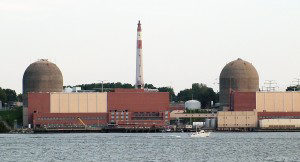Indian Point Energy Center nuclear plant will close in 2021 as part of an agreement with the state and Entergy Corp., which included the Ossining-based environmental group Riverkeeper, Gov. Andrew Cuomo confirmed Monday.
News of the plant’s closure was first reported Friday by The New York Times.


Under the terms of the deal, Entergy Corp., Indian Point’s operators, will shut down its Unit 2 reactor by April 2020 and the Unit 3 reactor by April 2021.
Closing Indian Point has long been a priority for Cuomo. While the governor last year pushed for billions of dollars in state subsidies to help keep upstate nuclear plants afloat as part of the state’s Clean Energy Standard, he has maintained that Indian Point poses too great a risk considering its location near New York City.
“For 15 years, I have been deeply concerned by the continuing safety violations at Indian Point, especially given its location in the largest and most densely populated metropolitan region in the country,” Cuomo said in a statement Monday. “I am proud to have secured this agreement with Entergy to responsibly close the facility 14 years ahead of schedule to protect the safety of all New Yorkers.”
Indian Point has the capacity to generate about 2,000 megawatts and provides about 25 percent of New York City and Westchester’s electricity, according to estimates from Entergy. The plant’s supporters have long argued that energy costs in the region would spike if the nuclear plant closed.
Indian Point employs 1,050 people among its two reactors. The nuclear plant is also a major provider of taxes for the town of Cortlandt, village of Buchanan, Hendrick Hudson School District and the county. Cortlandt Town Supervisor Linda G. Puglisi released a statement Friday calling on the governor to create a panel to study the economic and environmental impacts of the plant’s closing.
Westchester County Executive Robert P. Astorino, Cuomo’s opponent in the 2014 gubernatorial election, said the county had not been part of any talks regarding the plant’s closure. He called that a “big problem” and said the consequences of its shutdown would be enormous.
“Closing Indian Point will wreak unwarranted economic chaos on the county of Westchester,” Astorino said in a statement Friday. “Safety is always our paramount concern, but residents should know that the (Nuclear Regulatory Commission) has repeatedly disagreed with Cuomo’s assessment that the plant is unsafe.”
Entergy, a New Orleans-based company with an office in White Plains, has been trying to renew the federal licenses for its two reactors since 2007, but has been challenged by state officials throughout the process.
The relicensing efforts were dealt a major blow in November, when New York’s highest court said the company was not exempt from a review by the New York Department of State to ensure the plant’s license renewal was consistent with the state’s coastal management program. Entergy had argued it wasn”™t subject to the state”™s coastal regulations, as the rules took effect after the reactors were already running. New York had refused to grant Indian Point a coastal consistency certification, which gives the plant authority to operate on the Hudson River.
Entergy representatives pointed to decreasing wholesale energy prices and increasing operating costs as the main driver of the company’s decision to close the plant.
“In addition, we foresee continuing costs for license renewal beyond the more than $200 million and 10 years we have already invested,” said Bill Mohl, president of Entergy Wholesale Commodities, in a statement.
Here are the terms of the deal, as released by the governor’s office Monday:
- Early Close Date: Entergy Corp. has agreed to cease all operations at Indian Point and will shut down the Unit 2 reactor in April 2020. Unit 3 will be shut down in April 2021. Unit 1 reactor was permanently shut down in October 1974 because the emergency core cooling system did not meet regulatory requirements. In the event of an emergency situation such as a terrorist attack affecting electricity generation, the state may agree to allow Indian Point to continue operating in two-year increments but no later than April 2024 and April 2025 for Units 2 and 3 respectively.
- Rigorous Safety Requirements and Inspections: New York state will make annual inspections of the plant relating to key operational, regulatory and environmental matters. Entergy will transfer used fuel to protective storage in “dry casks,” the preferred method of safely storing spent fuel, at a minimum of four casks per year and at least 24 by 2021. In addition, at refueling all of the bolts will be inspected at both units and any bolts will be replaced to ensure the reactors”™ structural integrity through 2021. The plant”™s steam generator will be also be inspected for any cracks during refueling outages.
- Negligible Bill Impact: The Public Service Commission”™s Indian Point Contingency Plan and other planning efforts have ensured that more than adequate power resources are able to come on line by 2021 to ensure reliability of the power grid. Given these planning efforts and likely replacement resources, the plant”™s closure in 2021 will have little to no effect on New Yorkers”™ electricity bills.
- Limited Re-licensing and Outstanding Litigation: Entergy will submit a six-year license application to NRC. Entergy, New York state and other organizations will terminate litigation against one another.
- State Retains Legal Authority: Even though certain cases are settled, the state retains authority to bring additional action against Entergy if new cases arise.
- Workforce Protection: There will be continued employment at the plant throughout the closure process (through 2021), and under the terms of its agreement with New York state, Entergy has committed to offer plant employees new jobs at other facilities. The state of New York will work with workers to gain access to other job opportunities and worker retraining in the power and utility sectors within the state, including at other plants. ”‹And, through NYSERDA, the state will offer any worker retraining and new skills in renewable technologies like solar and wind.
- Replacement Power: Indian Point produces 2,000 megawatts of electrical power. Currently, transmission upgrades and efficiency measures totaling over 700 megawatts are already in service. Several generation resources are also fully permitted and readily available to come online by 2021, after the plant”™s closure, including clean, renewable hydropower able to replace up to 1,000 megawatts of power. Together, these sources will be able to generate more than enough electrical power to replace Indian Point”™s capacity by 2021.
- No Net Increase of Emissions Due to Closure: The governor”™s leadership on energy and climate change will ensure that Indian Point”™s closure will not have an adverse impact on carbon emissions at the regional level. Through the Regional Greenhouse Gas Initiative, the state will continue to drive reductions in greenhouse gases across the power sector. Further, the governor”™s Clean Energy Standard to get 50 percent of New York”™s electricity from renewables by 2030 is the most comprehensive and ambitious mandate in the state”™s history to fight climate change, reduce harmful air pollution, and ensure a diverse and reliable energy supply at affordable prices.
- Ongoing Environmental Protection: Entergy has also agreed to establish a $15 million fund to support environmental restoration and community benefit projects. The fund will support efforts potentially including, but not limited to, the protection and restoration of vital wetlands and estuaries, the creation and enhancement of wildlife habitat, invasive species migration, and the conducting of scientific studies to ensure the long-term viability of the area”™s natural resources.
- Local Tax Impact: The agreement allows for ample time to plan for and mitigate impacts to local tax revenues. Entergy’s previously agreed upon payments in lieu of taxes (PILOTs) to local government entities and school districts will continue through 2021, before being gradually stepped down at a negotiated level following shutdown. The state will also work with local communities to address potential revenue shortfalls, similar to how it has worked with communities affected by other plant closures through the existing fossil fuel plant retirement fund.”‹”‹
Riverkeeper, in a statement released Monday, called the deal a “landmark agreement.”


















